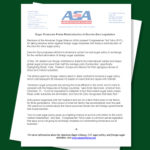2018: A Year of Subsidies
Congressman Ted Yoho (R-FL) recently reintroduced his zero-for-zero sugar policy resolution that targets sugar subsidies around the world. As he’s explained before:
Sugar is widely considered the world’s most distorted commodity market. Global sugar prices have fluctuated more than 200 percent since 2008 alone and often fall well below the cost of producing sugar. Why? Because of the actions of a few government-dependent producers….
Congress must look for smart ways to get governments out of private business. That’s why I’ve proposed a legislative solution called the zero-for-zero sugar policy, which has been gaining traction among free marketers and has been hailed as a model for all of U.S. farm policy.
It calls on the elimination of U.S. sugar policy in exchange for the elimination of the foreign subsidies and unfair trading practices that are distorting the global market. It would reward the world’s most efficient producers rather than the most coddled. And it is 100 percent consistent with the smart modernization of U.S. trade policy championed by our new Administration and endorsed by the electorate.
The need for this legislation has never been greater. Subsidized sugar surpluses are stacking up around the globe. Prices on the world sugar market are tanking and today don’t even cover half the average cost of producing sugar.
And foreign governments are doubling down on their subsidies. Consider these recent events that cropped up in 2018:
- To alleviate the pressure of a subsidy-fueled surplus, the Indian government last year mandated that 5 million metric tons of sugar be exported and sweetened the deal in September by announcing transportation subsidies to offset the cost of bringing sugar to port. Meanwhile, sugar mill owners are asking India to raise the government-set selling price of sugar in order to artificially raise the value of their stockpiles. This is all in addition to the $1.7 billion a year in government handouts already flowing to the industry.
- Brazil launched a WTO case against India to protect its dominance as a global sugar exporter. Of course, Brazil’s thriving sugar industry would not exist without decades of government intervention and subsidies to the tune of $2.5 billion a year.
- Aided by government subsidies estimated at $1.3 billion annually, Thailand has nearly doubled its production over the past ten years, 75% of which was exported into the world market in 2017/18.
- Much like India, Pakistan also hoped to control their domestic surplus last year by flooding the world market with cheap government-subsidized sugar. By incentivizing exports through $194 million worth of subsidies, the Pakistani government only served to further destabilize the world sugar market.
Enough is enough. It’s time to get foreign governments out of the sugar business, and Yoho’s sugar policy is the right recipe. That’s why the American Sugar Alliance, and the 142,000 U.S. farmers and workers it supports, is urging lawmakers to co-sponsor this common-sense solution.



